- Home
- Gordon Korman
Slacker Page 2
Slacker Read online
Page 2
Secretly, we referred to Mrs. B as Mrs. Backward, because that’s how she said everything. As in, “Gummy worms, you boys want?”
I was surprised she was so down on the Friends of Fuzzy, who were really famous in our town for doing good things like fund-raising and charity work. They operated out of Sycamore High. The name came from the high school’s mascot, Farley J. Peachfuzz.
Foam-spattered teenagers moved among the passing vehicles, dancing and trying to wave drivers onto the shoulder, where even foamier kids waited with sponges and buckets.
A large banner was strung between two light poles:
Well, I didn’t know the difference between a healthy spleen and an unhealthy one. (I made a mental note to Google it, though.) But it sure didn’t seem like the kind of thing anyone could be against.
Chuck thought so, too. “What’s wrong with the Friends of Fuzzy? Everybody likes the things they do.”
“Blocking traffic, those kids,” Mrs. B said disapprovingly. “An honest living, I’m trying to earn.”
“It’s for a good cause—I think,” I offered.
She snorted. “Ruining people’s livelihoods—such a good cause! Some advice, I’ll give you—don’t get involved.”
All at once, Cam snapped to attention. I’d seen that expression on his face before—when he’d found the cheat code on this shady Korean website that got us a free combat prestige upgrade. But nothing like that was happening now.
Then it came to me. Mrs. B had just said the magic word: involved.
Chuck didn’t pick up on it. “Oh, we’re not allowed in the Friends of Fuzzy,” he told the storekeeper. “It’s just for high school. We’re in eighth grade.”
“But what if someone started something like the Friends of Fuzzy at our school?” Cam asked.
I regarded him warily. “Like who?”
“Like me.”
Chuck was completely baffled. “What are you talking about?”
I thought I knew, but surely I had it wrong.
Mrs. B sounded suspicious. “The street, you won’t be blocking?”
Cam laughed. “I guarantee you’ve got nothing to worry about!”
I had a sinking feeling that the head worrier was about to be me.
Computers were another one of my talents. I’d first hacked into the school’s website before lunch on day one of sixth grade.
Cam peered over my shoulder. “Open up a new page under ‘School Clubs.’ ”
We’d gone straight from Sweetness and Light to my house—more specifically, to the laptop in my basement.
“I don’t get it,” I told him, poised at the keyboard. “If you want to convince your folks you’re getting involved, sign up for the film club and sleep in the dark. How could it be easier to start a middle school Friends of Fuzzy?”
“I’ll join,” Chuck offered loyally.
“No, you won’t,” Cam promised, “because this isn’t a real club. Don’t you get it? We create this splashy web page about a group of do-gooders and the amazing ways we serve the citizens of Sycamore. We make it sound like, compared to us, the Friends of Fuzzy are all goof-offs who wouldn’t give anybody else the skin off a grape. We’re dedicated, motivated, community-minded! And here’s the most important part: We don’t do any of it. We just say we do it.”
Chuck looked dazed. “What’s the point of a club that isn’t a club?”
“When my folks try to ban me from gaming, I’ll show them the page. Not only did I join something—I started it. I’m the president.”
It was a great idea, an inspired idea, even—doing less by pretending to do more. For all my appearances on the honor roll, I could never have come up with a scheme like that.
Still, I wouldn’t have been a true friend if I didn’t let him know I had my doubts. “What if it doesn’t work?”
He was dumbfounded. “How could it not work?”
“Well, first of all, your parents might not believe it,” I began.
“Why won’t they believe it? It’s on the school’s website. Why would the school lie?”
I chose my words carefully. “Your folks might think it’s a little too good to be true that you went from zero to running the show just like that. Or maybe the school will figure out that it’s all a hoax. Then not only will you be in trouble, but the whole thing can be traced to my computer.”
“The school never looks at their website except to post snow days,” he countered. “And my parents will be so overjoyed I’m getting involved in something besides video games that they’ll never question it. They deserve to be happy, considering all their business worries. Who are we to mess with their happiness?”
He was right about the business worries. Sweetness and Light wasn’t the only store in town that was suffering because of the mall. Boxer’s Furniture Showroom was losing a lot of customers to the big new department stores.
I sighed. “Fine. Does this wonderful club have a name?”
“How about Friends of Fuzzy, Junior?” Chuck suggested.
Cam shook his head seriously. “If we connect ourselves to them, we might be expected to help out with their stuff. If we have to do anything, the whole point of the club is down the tubes. No, we have to keep it general. How about the Positive Action Group?”
I typed it onto the web page. I couldn’t explain why, but it looked pretty good up there on the screen—like it stood for everything, when really it meant nothing at all. We might as well have called it Harry.
“It’s—okay,” I admitted in grudging surprise.
“It’s perfect,” Chuck added reverently.
“Ill,” Cam agreed.
We got to work—not technically something you said very often when “we” included Cam. It took some doing, but when I pushed my swivel chair back from the computer, the result on the screen was well worth it.
“It’s awesome—except for that last part,” Cam told me. “I don’t want anybody contacting me. I’m doing this so I can be left alone.”
“That’s the beauty of it,” I said smugly. I clicked the mouse, and instantly another page appeared on top of the first one.
“Wow,” Cam said with raised eyebrows.
I glowed. There was something about pleasing Cam. He was the kind of guy you wanted to impress, even though you knew the feeling wasn’t mutual. Cam didn’t try to impress. That didn’t make him a bad friend. It was just that impressing people didn’t fit into his lifestyle. And, of course, that lifestyle was what made him Cam.
The people who looked down on Cam were technically missing the point. He wasn’t just a slacker; he was the Leonardo da Vinci of slackers.
And the Positive Action Group might turn out to be his Mona Lisa.
I couldn’t stop worrying about Elvis.
What was going to happen to him? Rejected by his whole family … kicked out of his home … wandering around town with no place to call his own. It was so tragic. I got choked up just thinking about it.
He was so adorable, too. Buck teeth, fat cheeks, flat tail. When he slapped the water, you could hear it half a mile away. But not anymore. There was no water left to slap—not since they drained the creek when they built the new mall. I bet it hurt to beat your tail against the tarmac of the parking lot.
He was too old to keep up, I guess. The rest of the beaver colony moved on when their lodge was destroyed by the construction company. But Elvis couldn’t hack it, the poor little guy. He stayed behind in Sycamore and made the best of it. But he had nothing—no lodge, no other beavers to hang out with, no purpose in life besides chewing on things. He still did that. And when he chewed on people’s fence posts and swing sets and deck chairs and cable wires, they got angry just because the TV went out during Sunday Night Football.
Those were the kinds of people who lived in this town: People who valued football over a human life. Well, a beaver life, anyway.
That was the whole problem with Sycamore. Nobody cared—not about a poor homeless beaver, not about anything. We all stoo
d around, pretending everything was fine while the mall sucked all the business away from Main Street. No—it was worse than that. We were the customers abandoning our own town and driving to the mall to do our shopping. No wonder the Transportation Department was planning to demolish Sycamore’s crumbling interstate exit, now that there was another ramp a mile and a half down the road to service the mall. Think about that: Our whole community wasn’t worth the cost of a little shoring up and road work. What would happen to our stores then? For all anybody gave a hoot, they’d close one by one, leaving downtown an empty shell. And then poor Elvis wouldn’t even have the garbage Dumpsters to eat out of.
Our school was a perfect example of Sycamore’s bad attitude. I sat with my iPad, browsing through the Sycamore Middle website. There were pictures of parties, dances, and pep rallies. Even the listings of school clubs only emphasized how self-centered we were. The track team—oh, you can’t run? Too bad. The art club—you’re all thumbs? Take a hike. The drama society—you’ve got stage fright? Tough buns. The chess club—no brains? No dice.
And … what was this? The Positive Action Group? I’d never heard of that one before. It must have been something new. It was probably cheesy, but the name sounded so—positive.
I read the whole thing, and I’ll bet my jaw was hanging down to my knees. Confession: I could be kind of a complainer. But the Positive Action Group wasn’t just positive; it was exactly what Sycamore Middle School needed most—and at exactly the right time. In the middle of all these selfish teams and clubs designed to cry out, “Look how great I am!” here was a school organization completely devoted to helping other people.
I pictured the crowded halls between periods—eight hundred kids grunting, shoving, and slouching their way to the next class. Who in that group could possibly be awesome enough to have come up with the Positive Action Group?
I squinted at the screen:
Cameron Boxer?
I knew Cam Boxer. He was the laziest kid in the whole school! There was no way he could be the head of anything like the P.A.G. A stood for Action, and he was the total opposite of that. The only helping he ever did was helping himself to cookies on Parents’ Night.
But maybe I was wrong. People changed, after all. Like, I used to eat tuna that wasn’t caught in dolphin-safe nets, and now I’d rather starve. Cam didn’t seem like the kind of guy who’d get into helping people, but who was I to judge? After all, it was right here in black and white on the school’s website.
He deserved my support, not my suspicion. The P.A.G. would never have a more enthusiastic member than me.
I wasn’t even going to wait till Monday to join up. Since the contact link on the site wasn’t working, I would go over to Cam’s house this minute to sign on the dotted line. And it would be my chance to tell Cam face-to-face how great I thought he was for doing this.
I looked up his address. He lived on Ontario Street, only a few blocks over from me.
When I got there, it was kind of weird. The house was nice enough—two stories with red brick and white-painted shutters. But there was no door. It wasn’t open, or anything like that. Where the door should have been, someone had nailed up a big sheet of plywood.
I knocked on it and called out, “Cam?”
There was no answer, although I could hear sounds coming from inside—kind of like distant explosions.
I banged harder. I couldn’t find a doorbell—it might have been covered by the plywood. Quite a few people had scribbled their names on the surface. I knew some of them from school. Was this kind of like leaving a message, the plywood equivalent of voice mail? Was I supposed to do that, too?
I didn’t. Writing on walls was almost like vandalism. For sure the Positive Action Group would be against that.
It was then that I noticed a light glimmering in the corner of a basement window. I crouched to peer inside. I couldn’t see much because there was some kind of pillow jammed in the inside alcove. But through a tiny corner, I could squint into the rec room in the basement. This was definitely where the explosions were coming from. I could hear them much more clearly as I hunkered down in the flower bed. And there was Cam—or at least I thought it was him. I could only make out the top of his head, but it was his light brown hair and slightly hunched shoulders.
What was he doing down there? Why didn’t he answer the door? I mean, there was no door, but why didn’t he answer the plywood? I’d banged pretty hard.
This time I got down on my knees and knocked on the glass. The kid didn’t even look up. I was starting to get a little worried. What chance did the Positive Action Group have if its president didn’t know enough to answer his door—or whatever was supposed to be nailed across the front entrance of his house?
“Cameron Boxer!!” I bellowed.
As the landing craft approached the shores of Okinawa, we were taking withering fire from the island’s defenders. Shells burst all around us, sending up geysers of water. Tracer bullets cut through the waves. The thump of antiaircraft guns assaulted my eardrums, sending black puffs into the sky above. And another sound—I lifted the headset from my ears and strained to hear.
Bang, rattle! … “Cameron Boxer!” … Rattle, bang!
“Who’s making all that noise?” I asked in annoyance.
“It’s the Japanese army!” called Chuck over the headset.
“Not that noise! Somebody’s outside my house!”
“Don’t look at us,” Pavel reasoned. “How could we be in the game if we’re outside your house?”
And then we all heard Darth Vader’s diabolical cackle.
Chuck panicked. “Evil McKillPeople!”
I used the controller to take evasive action. “He won’t get us this time!”
There was a crimson flash and a deafening boom, and pieces of our boat and our avatar bodies began raining down into the sea. I distinctly saw my leg go by. For the first time, I found myself regretting that the graphics in this war game were so realistic. Who was this Canadian, this Evil McKillPeople? And why was he so good that he could always wreck me?
Bang, rattle! … “Cameron Boxer!” … Rattle, bang!
I glanced up at the window. All I could see was a fist pounding behind the sofa cushion I’d jammed there. We needed a bigger couch. Privacy was important to my lifestyle. “Who is that?”
“Why don’t you go up and see?” Chuck suggested.
“No way,” I retorted. “We’re taking down McKillPeople once and for all!”
“You wish,” chortled the deep voice over the headset.
“The last time you tried that strategy,” Pavel reminded me, “the fire department axed in your door.”
The sensible advice came from Chuck. “It’ll be a few minutes before we can get a new platoon together anyway. Go see who it is.”
Bang, rattle! … “Cameron Boxer!”
“Just a minute!” I shouted.
Despite the clatter, I took my time going upstairs. After all, it wasn’t like the entire Sycamore Fire Department was on my lawn—at least not this time.
I slipped out via the back slider and walked around the house to the front. The girl who stood pounding on the plywood was slight, almost compact, with medium-brown hair pulled back in a ponytail. Daphne Leibowitz. We’d been in school together since kindergarten, but I couldn’t remember ever having a single conversation with her. Why was she suddenly standing on my porch, banging on the plywood and barking my name?
Spying me, she asked, “What happened to your door?”
“It’s a long story,” I replied, hoping that she wouldn’t demand to hear it. Downstairs, Okinawa beckoned—and another shot at Evil McKillPeople, if he was still online.
“How do you get in and out?” she persisted.
“Around the back.”
“Well, what are we waiting for?” she said impatiently. “We’ve got a lot of work to do.”
I didn’t like the sound of that—the work and the we, especially when they were used together. I dou
bted I’d said more than a few sentences to this girl in my entire life. There was no work, and there was definitely no we.
But Daphne didn’t see it that way. She marched right past me, around the house, and in through the slider to the kitchen. Well, I couldn’t very well leave her alone in there and go someplace else. And if I went back down to the basement, she’d just follow me.
“So, about this ‘work’ … ” I said finally. The word burned my tongue.
“Good thinking. We should get to it.” She opened her backpack, pulled out an iPad, and swiped the screen to bring up a web page.
I instantly recognized the logo of Sycamore Middle School. I leaned closer to investigate further.
I almost choked. That wasn’t just any page from the school site. That was my page—and one of the illest ideas I’d ever had, too. My mother was so puffed up with pride over the Positive Action Group that her feet hadn’t touched the ground in the three days since I’d first shown it to her. Dad was pretty psyched, too—at least, he hadn’t mentioned the cost of the new door lately. And he’d taken to punching me playfully in the arm and calling me Mr. President. Even my kid sister, Melody, complained a little less about me hogging the game system. Nobody messed with a student leader, especially not with a class-A do-gooder like me.
Or so I assumed.
Daphne fixed me with earnest eyes. “Honest, Cam, this is the best thing ever!”
“I used to think so,” I agreed miserably.
“Seriously, it restores my faith in the kids in this town. You must have changed a lot since that field trip where everything got canceled so we could search for you, and it turned out you were holed up in the bathroom playing video games on one of those handheld thingies.”
I remembered that trip. The outdoor center. To be fair, it wasn’t my fault nobody was smart enough to look in the bathroom. But I was glad they didn’t. I reached level sixty-seven that day.
“So as soon as my membership goes through,” she went on, “we can start planning our first big project.”

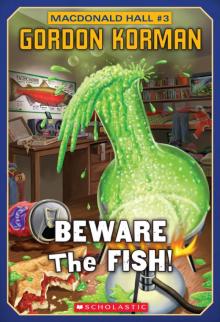 Beware the Fisj
Beware the Fisj Slacker
Slacker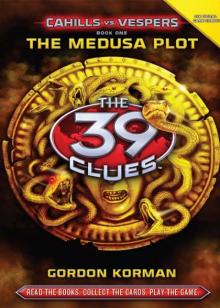 The Medusa Plot
The Medusa Plot This Can't Be Happening at MacDonald Hall!
This Can't Be Happening at MacDonald Hall!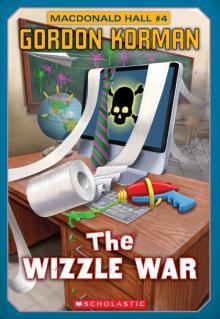 The War With Mr. Wizzle
The War With Mr. Wizzle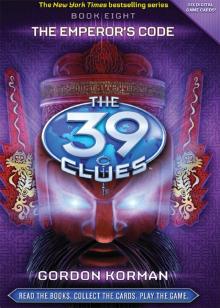 The Emperor's Code
The Emperor's Code Zoobreak
Zoobreak The Danger
The Danger Unsinkable
Unsinkable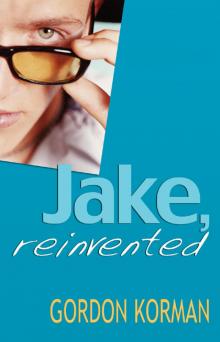 Jake, Reinvented
Jake, Reinvented No More Dead Dogs
No More Dead Dogs The Stowaway Solution
The Stowaway Solution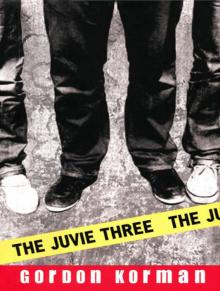 The Juvie Three
The Juvie Three The Climb
The Climb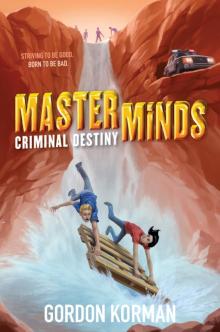 Criminal Destiny
Criminal Destiny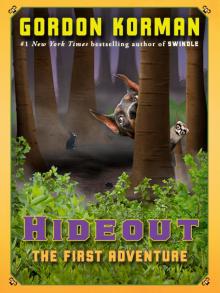 Hideout: The First Adventure
Hideout: The First Adventure Flashpoint
Flashpoint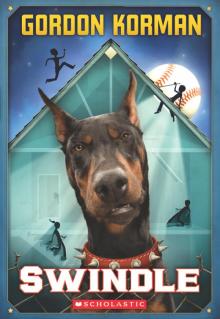 Swindle
Swindle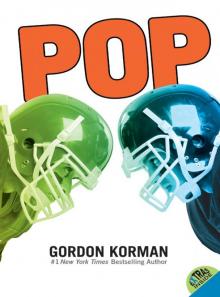 Pop
Pop The Rescue
The Rescue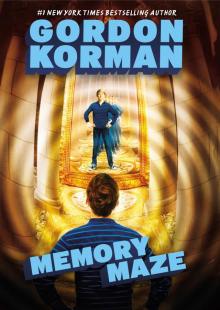 Memory Maze
Memory Maze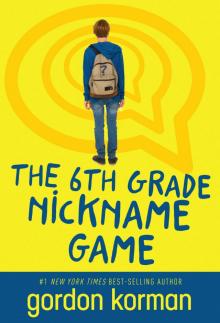 The Sixth Grade Nickname Game
The Sixth Grade Nickname Game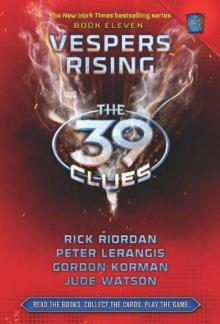 Vespers Rising
Vespers Rising Collision Course
Collision Course The Abduction
The Abduction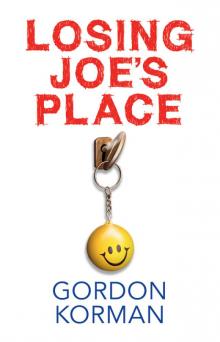 Losing Joe's Place
Losing Joe's Place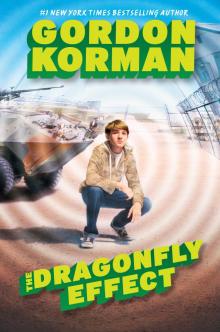 The Dragonfly Effect
The Dragonfly Effect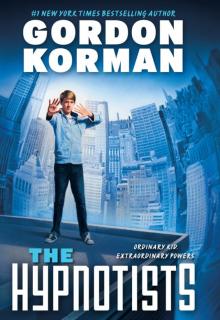 The Hypnotists
The Hypnotists Survival
Survival Lights, Camera, DISASTER!
Lights, Camera, DISASTER! Payback
Payback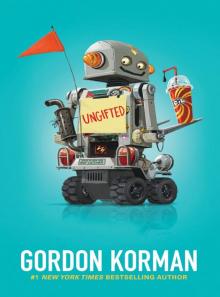 Ungifted
Ungifted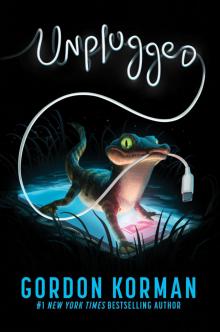 Unplugged
Unplugged Framed
Framed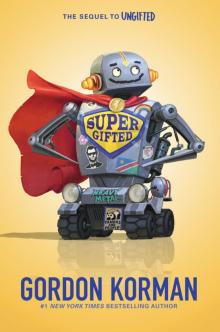 Supergifted
Supergifted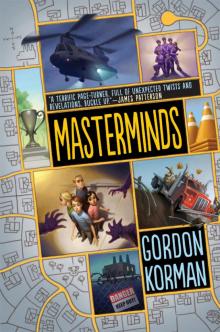 Masterminds
Masterminds Jackpot
Jackpot Don't Care High
Don't Care High The Deep
The Deep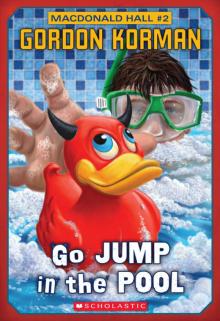 Go Jump in the Pool!
Go Jump in the Pool! The Contest
The Contest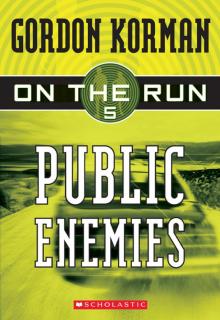 Public Enemies
Public Enemies Hideout: The Second Adventure
Hideout: The Second Adventure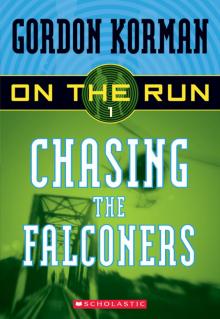 Chasing the Falconers
Chasing the Falconers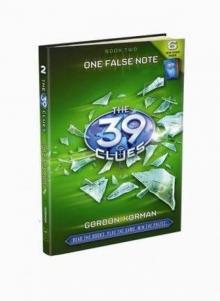 One False Note
One False Note Shipwreck
Shipwreck Jingle
Jingle Unleashed
Unleashed Son of the Mob
Son of the Mob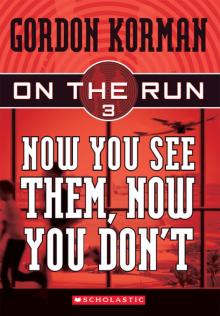 Now You See Them, Now You Don't
Now You See Them, Now You Don't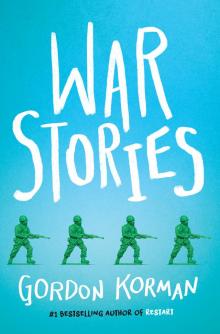 War Stories
War Stories Schooled
Schooled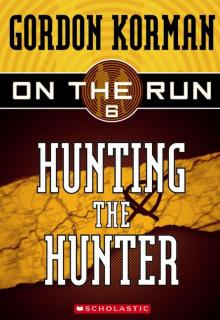 Hunting the Hunter
Hunting the Hunter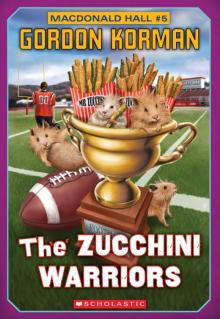 The Zucchini Warriors
The Zucchini Warriors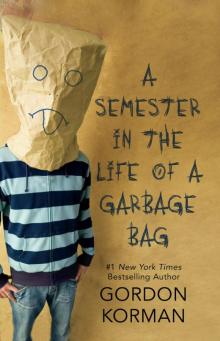 A Semester in the Life of a Garbage Bag
A Semester in the Life of a Garbage Bag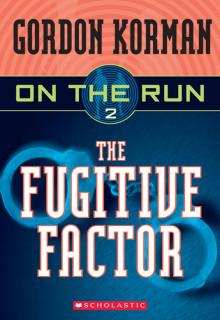 The Fugitive Factor
The Fugitive Factor Born to Rock
Born to Rock The Summit
The Summit Showoff
Showoff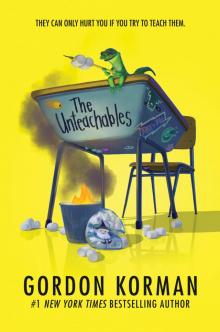 The Unteachables
The Unteachables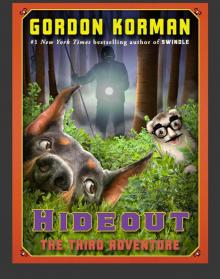 The Third Adventure
The Third Adventure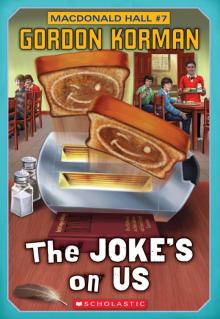 The Joke's on Us
The Joke's on Us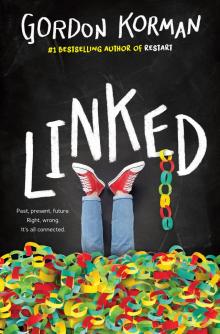 Linked
Linked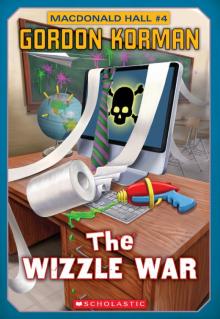 The Wizzle War
The Wizzle War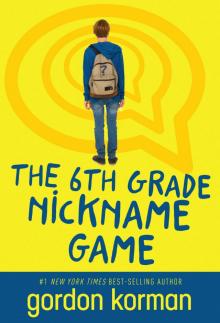 The 6th Grade Nickname Game
The 6th Grade Nickname Game The Second Adventure
The Second Adventure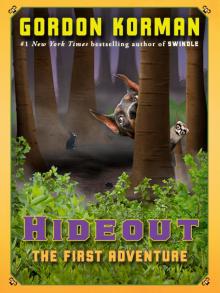 The First Adventure
The First Adventure![39 Clues : Cahills vs. Vespers [01] The Medusa Plot Read online](http://i1.bookreadfree.com/i2/04/10/39_clues_cahills_vs_vespers_01_the_medusa_plot_preview.jpg) 39 Clues : Cahills vs. Vespers [01] The Medusa Plot
39 Clues : Cahills vs. Vespers [01] The Medusa Plot